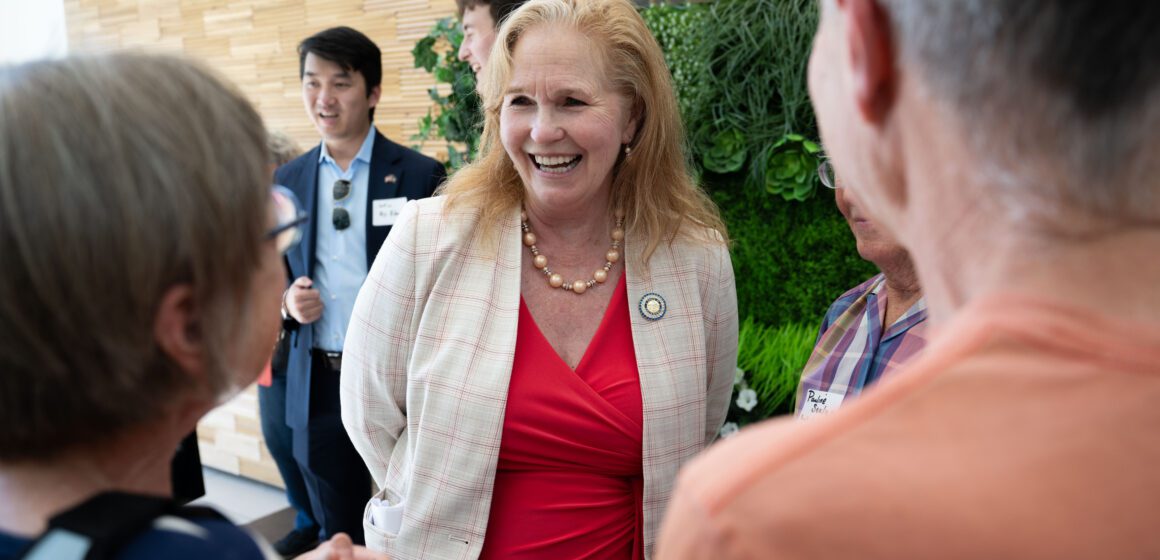Before election season heats up, one state lawmaker wants to eliminate potential threats from artificial intelligence spreading misinformation in political advertising.
Assemblymember Gail Pellerin, who represents District 28, plans to introduce a bill in the coming weeks to ban political advertising materials deceptively altered through AI. District 28 includes Santa Cruz, Los Gatos and parts of San Jose, which has been recognized as a nationwide hub for the AI industry.
The bill targets false advertising tactics such as deepfakes — an image or recording manipulated to misrepresent someone doing or saying something not actually done or said — as well as altered robocalls that spread false information and false images in political mailers.
Pellerin, who served as the chief elections official in Santa Cruz County for nearly three decades, said she hopes the bill will protect California voters from political misinformation in the upcoming 2024 elections.
“We’re in a challenging environment, and we want to make sure that people are getting correct information from trusted sources, and not getting images and audio or video that are spreading lies and deceit,” she told San José Spotlight.
The bill follows a push from local lawmakers to regulate the use of AI regarding the spread of doctored information.
Pellerin is working in collaboration with the California Initiative for Technology and Democracy, or CITED, a subsidiary of political nonprofit California Common Cause.
Jonathan Mehta Stein, chair of CITED’s board of directors and executive director of California Common Cause, said compared to other industries, technology is not as regulated, which risks spreading false information. Last year, San Jose published its first set of guidelines for AI use in the workplace.
“If you’re trying to deceive voters or you’re trying to undermine faith in elections, you have powerful, cheap, easy to access tools today that you’ve never had before,” he told San José Spotlight. “And right now, there is no governmental response and the public is totally not ready. Someone has to act to protect voters and protect democracy.”
California passed Assembly Bill 730 in 2019, which requires disclosure if campaign materials contain deepfakes. Assemblymember Marc Berman, who represents District 23 which includes Half Moon Bay, Campbell, Mountain View and Palo Alto, authored the bill.
Berman also authored Assembly Bill 873, effective as of Jan. 1, that integrates media literacy into the state school system to prevent misinformation.
“Efforts to limit the tide of misinformation are essential for the health and safety of our civic society,” Berman told San José Spotlight. “Voters deserve to know what is real versus what has been created or altered by technology to try to trick them into believing something that never happened.”
Pellerin said manipulated messages could lower the amount of participating voters. She said, for example, if voters receive a robocall telling them their voting location has changed, and they arrive at the wrong location, they may just give up.
“Imagine going to the wrong location and then finding out the right location is miles away and you just throw up your hands and say, ‘Forget it. I’m just going back to work,’” she said.
Mehta Stein said Pellerin’s bill will tackle a problem voters want addressed. Of Californians surveyed in a poll conducted by the Institute of Governmental Studies at UC Berkeley, 84% said they are concerned about the risks deepfakes, misinformation and AI pose to this year’s elections.
“The one thing we can’t do is nothing because who knows what state our elections will be in on the other side of November 2024,” Mehta Stein said.
Contact Annalise Freimarck at [email protected] or follow @annalise_ellen on X, formerly known as Twitter.



Leave a Reply
You must be logged in to post a comment.